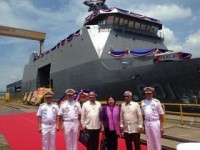Whatever this or any other crop of politicians vying for the hallowed vote of the Filipino say, it is evident that the Philippines continues to fall further and further behind most measures of success. The standards are being set by its neighbours in the otherwise vibrant southeast Asian region.
For one thing, the Philippines’ competitors are giving themselves ambitious goals. Indonesia, after recently announcing the start of construction of its first bullet train which is to link its capital city Jakarta with the city of Bandung 160 kilometres away, has reportedly expressed a goal to “dominate the ship market in Asia”. It seems to be on track to make good on this promise after completing the first of two Strategic Sealift Vessels (SSV) built by its state-owned shipbuilding company PT PAL to be delivered to the Philippine Navy in late 2016.

The Philippine Navy’s new SSV BRP Tarlac built by Indonesian shipbuilder PT PAL.
(Image source: Philippine Navy)
(Image source: Philippine Navy)
“We have to be a winning nation. We must not always be a loser as we already have superiority in shipbuilding industry,” said Indonesia’s Coordinating Minister for Maritime Affairs, Rizal Ramli during the vessel’s launch ceremonies.
Indeed, regional current affairs journal The Diplomat proposes the possibility of an “Indonesian defense revolution” under current President Joko Widodo. Widodo considers self-reliance key to achieving their strategic military development objectives and is embarking on a programme to ensure military technology is aggressively acquired by Indonesia’s state-run military equipment manufacturers.
[Widodo] said Indonesia should stop its habit of chasing after foreign weapon systems without making efforts to boost domestic production. He also added that the focus should be on building integrated defense equipment systems. Predictably, he also found a way to work in his global maritime fulcrum doctrine, emphasizing that the country’s shipbuilding industry should be able to produce non-military equipment as well like commercial ships. The whole point of this defense transformation, Jokowi stressed, is to ensure the industry is “developed for long term use, not only for one or two years.”
Filipinos should start asking their leaders and, more importantly, themselvesif they are up to the challenge of foisting the same kind of ambition upon themselves. Indeed, in the case of Indonesia’s military goals, the self-reliance doctrine that is central to this mission is “reflected in the 2012 Law on Defense Industry, and is central to realizing the country’s goal of developing the Indonesian military (TNI) into a minimum essential force by 2024”.
Do Filipinos have ambitious goals that are as specific and as absolute as those of Indonesia’s?
An essential ingredient to putting the Philippines on a path to greatness is articulating a clear direction. Truly grand visions are built upon a solid foundation of just a handful of key fundamentals — rule of law, social justice, strong economy, and a government sector focused on public service.
Unfortunately, many of the promises laid out by virtually all Filipino politicians do not go beyond these basics. They pitch justice, economy, and service as ends by themselves rather than stepping stones to more lofty dreams. Filipino voters, for their part, have long been conditioned to expect very little of their leaders and of themselves. As such, the results of both their collective efforts and the efforts of their leaders consistently fall short of achieving these mere basics.
The current crop of presidential candidates reflects this abject mediocrity in aspirations. Rodrigo Duterte’s promises do not go beyond the 6-12 month horizon. Indeed, he invites Filipinos to “kill him” if he fails over that short period to meet his shortsighted promises. Liberal Party candidate Mar Roxas has turned his party tagline “Daang Matuwid” into his campaign mantra, yet is unable to tell Filipino voters in specific terms where this supposedly “straight path” leads to. Current Vice President Jejomar Binay who is also running for the presidency is content with simply proving he is not a crook. Filipinos will likely vote for him if he succeeds in persuading them to see beyond all that. The other candidate, Grace Poe, suffers from a crisis of citizenship and will likely spend the presidency defending her right to be called a “Filipino”.
Nowhere in the political “debate” is any semblance of strategic vision discussed. The minds of even the country’s top opinion-shapers are imprisoned by the small square that ringfences the landscape of the Philippines’ political discourse. One social media “activist”, for example is caught up in a futile campaign to convince Filipinos to vote for Mar Roxas on the back of the lame threat of a Binay presidency if Roxas loses.
That sort of thinking can hardly ever compare to the foundational thoughts applied by a new crop of southeast Asian people who have set their sights at nothing less than taking their places at the top of the global food chain.
Will the Philippines ever let go of its mediocre and defeatist style of thinking and join its forward-looking peers in the region?
For now, these elections and the candidates playing in its field do not offer a promising answer to that question.
http://getrealphilippines.com/blog/2016/01/how-the-philippines-can-catch-up-with-the-rest-of-southeast-asia/

No comments:
Post a Comment